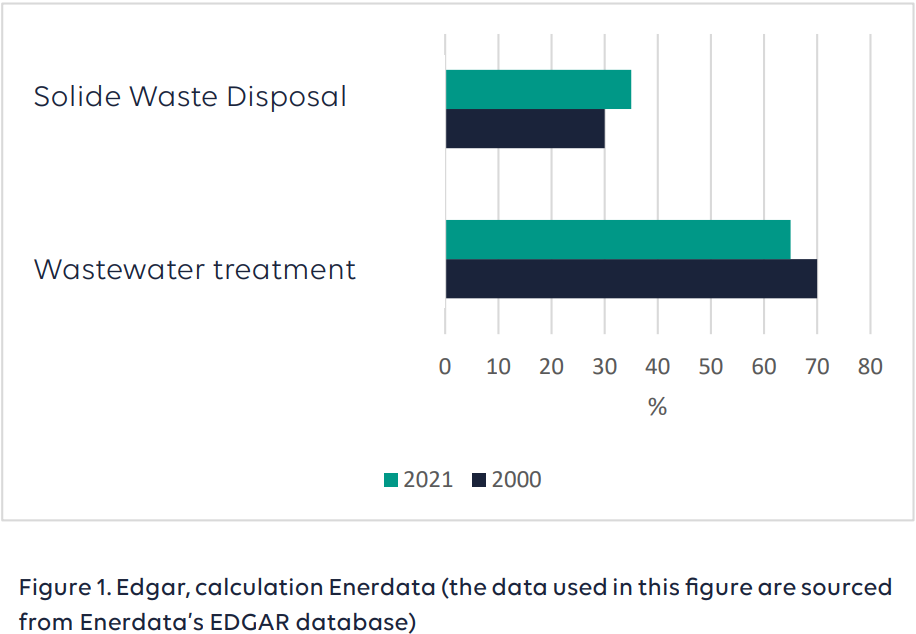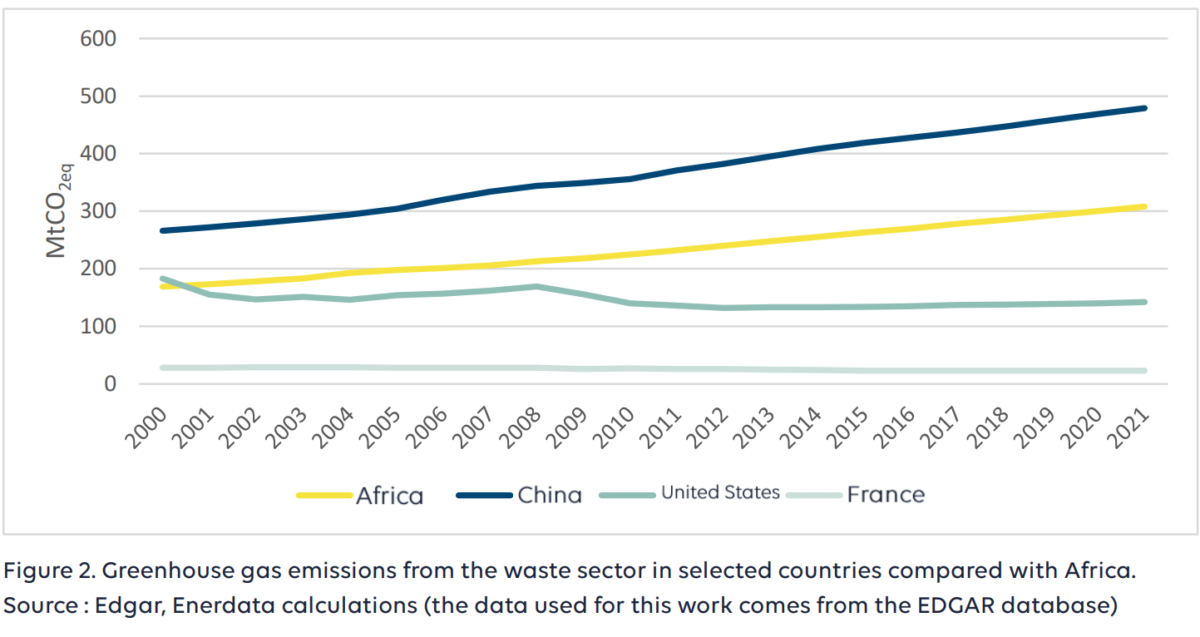In Africa, greenhouse gas emissions from the waste sector increase, despite efforts from various actors
[June 2023] Demographic growth in Africa, combined with rapid urbanisation, poses challenges in a number of sectors, including waste management. Existing policies for sustainable waste management are having insufficient impact in the face of ever-increasing waste production and the resulting greenhouse gas emissions.
Analysis note by the Observatory of Climate Action in Africa
- Authors : Mélaine Assè-Wassa Sama, Project Officer for Climate Action in Africa, Victor Bérenger, Senior Energy & Climate Policy Analyst, Enerdata
- Date : June 2023
- Summary
- Waste management, a present and future challenge despite a strong regulatory framework
- In Africa, waste weighs more heavily on the carbon footprint than in the rest of the world
- Local initiatives contribute to better waste management in Africa
Demographic growth in Africa, combined with rapid urbanisation, poses challenges in a number of sectors, including waste management. While policies exist to regulate the sector and ensure sustainable waste management, their impact remains insufficient. Waste production is steadily increasing on the continent, which also has to cope with the resulting greenhouse gas emissions.
Waste management, a present and future challenge despite a strong regulatory framework
For several years now, waste production on the African continent has been rising steadily, driven in particular by demographic growth and galloping urbanisation. Combined with the expansion of the middle class, changing consumption habits are leading to an increase in waste production. In 2016, for example, sub-Saharan Africa produced 174 million tonnes (Mt) of household solid waste ( hereafter MSW). While between 70% and 80% of this waste is recyclable, only 4% is actually recycled. According to estimates by the African Clean Cities Platform, waste production will reach 244 Mt in 2025. This represents a huge challenge for the continent, despite the existence of waste management policies backed by international regulations.
Policies and strategies are being implemented across the continent. The African Union’s Agenda 2063, a strategic framework for the socio economic and political transformation of the African continent, calls for a transformation of the waste sector, with quantified targets. According to this strategy, drawn up in 2013, African countries will have to recycle at least 50% of the urban waste they generate by 2023. On a sub-regional scale, the environmental policy drawn up in 2008 by the Economic Community of West African States (ECOWAS) includes strategic axes relating to waste management. Axis 3 aims, on the one hand, to combat pollution and nuisances, urban waste and flows of hazardous products and, on the other, to improve urbanisation and urban management policies by taking environmental aspects into account. ECOWAS has also developed two draft strategies: one on the management of chemicals and hazardous waste (2015) and another on the management of plastic waste (2016).
These various strategies and policies are complemented by national action strategies and policies drawn up by individual states. They are also reinforced by a set of international commitments made by African states through Multilateral Environmental Agreements (MEAs). This is the case with the 1989 Basel Convention on the Control of Transboundary Movements of Hazardous Wastes and their Disposal to which many African countries are party. It is also the case of the Stockholm Convention on Persistent Organic Pollutants of 2001 and the Minamata Convention on Mercury of 2013. In addition to these international conventions, there is the 1991 Bamako Regional Convention on the Ban of the Import into Africa of Hazardous Wastes and on the Control of Transboundary Movements and Management of Hazardous Wastes within Africa. African states are also currently involved in negotiations leading to the adoption of a global treaty against plastic pollution.
Despite the existence of these policies, waste management commitments in Africa are struggling to translate into improved waste management. Many African countries lack adequate infrastructure for waste collection, treatment, and disposal. Public awareness of waste management is often limited, hampering efforts to reduce, recycle and reuse waste. Dumping sites are common in Africa, where 19 of the world’s 50 largest landfill sites are located, with their attendant environmental, health and social problems. With the growth of the electronics industry and the resulting illegal waste flows, the management of electronic waste is making treatment and disposal practices even more complex. This combination of factors partly explains the increase in greenhouse gas emissions linked to the waste sector.
In Africa, waste weighs more heavily on the carbon footprint than in the rest of the world
Over the period 2000-2021, greenhouse gas emissions from waste in Africa grew almost twice as fast as overall emissions (excluding Land Use, Land Use Change and Forestry LULUCF), now accounting for around 8% of the total. Consisting mainly of methane (95%), these emissions are linked mainly to the treatment and discharge of wastewater (65% in 2021) and, to a lesser extent, to the disposal of solid waste (35%). The weight of this source in the sector’s total emissions is nevertheless increasing, with a rise of 5 percentage points between 2000 and 2021 (figure 1).

The waste sector accounts for around 8% of Africa’s greenhouse gas emissions (2021), compared with 2% for the United States, 3% for China and 5% for France. Nevertheless, in absolute terms, Africa’s waste-related emissions are more than a third lower (36%) than those of China. Over the period 2000-2021, these emissions increased by 3%/year, i.e. a growth rate twice as high as the increase in total (figure 2).
The main countries responsible for waste sector emissions in Africa are Nigeria (15%), followed by South Africa (8%), Algeria (7%), Egypt (7%), Morocco (7%) and, finally, Ethiopia (6%) and DR Congo (6%). For around a dozen African countries, emissions from the waste sector account for more than 10% of total emissions, including Djibouti (21%), Morocco (19%), Comoros (16%), DR Congo (14%), Rwanda (14%) and Gambia (13%). (21 %), le Maroc (19 %), les Comores (16 %), la RD Congo (14 %), le Rwanda (14 %) et la Gambie (13 %).
Emissions from the waste sector in Africa are mainly composed of methane (95%) and to a lesser extent nitrous oxide (5%). Carbon dioxide accounts for less than 1%. In fact, emissions caused by the incineration of waste in the open air remain marginal (<1%) compared with emissions linked to the treatment and discharge of wastewater (65% in 2021, compared with 70% in 2000) and the disposal of solid waste (35%, compared with 30% in 2000). Between 2000 and 2021, the share of emissions linked to the elimination of solid waste increased by 5 percentage points.

Wastewater and its sludge components can produce methane if they degrade anaerobically. The volume produced depends mainly on the amount of biodegradable matter in the wastewater, the temperature and the treatment system. The rate of methane production increases with rising temperature, particularly in unregulated systems and in hot climates. In the case of solid waste disposal, methane emissions come from the degradation of organic matter under anaerobic conditions.
In Morocco, greenhouse gas emissions from the waste sector increased by around 2.6%/year over the period 2000-2021, compared with 2.9%/year for total emissions. Emissions from the waste sector consist mainly of methane (97%) and, to a lesser extent, nitrous oxide (3%). Accounting for 20% of total emissions, in 2021 75% will come from the disposal of solid waste (compared with 69% in 2000) and a quarter from the treatment and discharge of wastewater (compared with 31% in 2000). Between 2000 and 2021, greenhouse gas emissions generated by the waste sector in DR Congo grew at a rate of 4%/year, compared with 2.5%/year for total emissions, driven by the increase in emissions caused by solid waste disposal (+6.2%/year). As in Morocco, most emissions from this sector are methane (97%). However, their sources differ: in the DRC, as generally in the rest of Africa, they come mainly from the treatment and discharge of wastewater (69% in 2021, compared with 80% in 2000), followed by the elimination of solid waste (31% in 2021, compared with 20% in 2000). The weight of emissions caused by the elimination of solid waste in the sector’s total emissions has nevertheless increased by 11 percentage points between 2000 and 2021.
Local initiatives contribute to better waste management in Africa
The increase in gas emissions linked to the waste sector can be explained by a certain lack of infrastructure, skills and funding. In some low income countries, waste management absorbs up to 20% of municipal budgets. Local governments often lack funds, « covering less than 50% of investment costs for waste management systems ». To cope, public authorities often rely on local players or join forces with private partners to manage waste in an environmentally sound way.
These alliances often include local authorities, local and foreign companies, associations and citizens. In Africa, public-private partnerships, although used, have produced mixed results due to the financial and political difficulties encountered. In 2017, for example, the city of Casablanca (Morocco) and Sita, the Suez subsidiary in charge of urban waste treatment, terminated their contract ahead of schedule. While the city pointed the finger at the unfavourable value for money of the service, Suez deplored « the lack of profitability of the activity, estimating its losses at 12 million euros in three years« . A similar situation has arisen in Libreville, Gabon, where the Averda Gabon group (a subsidiary of Averda Holding) has filed an arbitration claim against the Gabonese authorities at the Chamber of Commerce and Industry (CCI) for a debt estimated at 35 million euros. Financial, institutional and political complications continue to complicate the workings of the CCI in Africa.
On another scale, initiatives led by local and international associations are also helping to improve waste management systems in Africa. In Cameroon, the EcoClean Environnement cooperative, through its waste pre-collection and recovery programme in the city of Yaoundé, collects more than 19.1 tonnes of waste (representing 2% of the city’s monthly waste output), which it sorts, recovers and deposits at the Urban Community’s voluntary drop-off points (PAV) for final disposal. This initiative is helping to reduce greenhouse gas emissions, such as the methane produced by unauthorised landfill sites in Cameroon.
In Senegal, the Association Zéro Déchet is federating and promoting Senegalese restaurants committed to reducing waste through its Mon Restaurant Zéro Déchet initiative which awards 3 labels (Zero Plastic Bottles, Zero Disposable Straws, Zero Coffee Capsules). Thanks to this initiative, 37 restaurants in Senegal have been awarded the label. The initiative avoids the use of 28,702 plastic bottles per year, as well as 81,094 disposable straws per year. These initiatives sometimes benefit from external funding. This is the case with the SWITCH AFRICA GREEN (SAG) project run by the NGO Women Environmental Programme Burkina (WEP BF). Funded by the European Union via the United Nations Environment Programme (UNEP), and carried out between January 2016 and June 2018, this initiative has made it possible to change the production waste management methods of around a hundred companies in Burkina Faso by using industrial symbiosis.
Bibliography
• Ayuba et al. (2013). « Current Status of Municipal Solid Waste Management Practise in FCT Abuja ». Research Journal
of Environmental and Earth Sciences.
• Bello, I. A. et al. (2016). « Solid Waste Management in Africa: A Review ». International Journal of Waste Resources
• Direction de l’environnement (Commission de la CEDEAO. (2008). La politique environnementale de la CEDEAO.
CEDEAO.
• La Tribune (2017). « Collecte des déchets : Suez perd son contrat avec Casablanca ». La Tribune.
• Maussion, E. (21/02/2020). « Gestion des déchets : les capitales africaines cherchent encore le modèle gagnant ».
Jeune Afrique.
• Global Observatory of Climate Action (2022). Global Synthesis Report on climate action by sector. Climate Chance.
• PNUE (2018). L’Avenir de la Gestion des Déchets en Afrique. Programme des Nations Unies pour l’Environnement.
• Silpa, K., Yao, L. et al. (2018). What a Waste 2.0: A Global Snapshot of Solid Waste Management to 2050. Urban Development Series. World Bank.
• World Bank. (2017). Municipal Solid Waste (MSW) PPPs. World Bank Group.
• Ymelé, J-P. (2012). Cameroon own path towards municipal solid waste management



